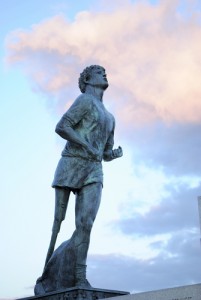Contributed by John Wertz, Blacksburg, VA
Warm-up Question
The ancient Greek philosopher Heraclitus famously said, “The only constant in life is change.” Name three things in your life that have changed since the beginning of the school year?
Transcendent Moment
 Chances are that you or someone in your family was one of over 115 million people who watched the Super Bowl last weekend. When the game was over, Joe Flacco was named as the Most Valuable Player for the game. Now to be sure, Flacco is still the same person he was before the game, but by shining brightly in the biggest game of the year, Flacco will now be seen in a different light by those around him. People around the world will suddenly know his name. Companies will ask him to endorse their products. He’ll be lifted up by fans and celebrated as a hero in his community and eventually his team, or another team interested in his abilities, will probably pay him more money in his next contract. Thanks to this one event on this one day his life will change.
Chances are that you or someone in your family was one of over 115 million people who watched the Super Bowl last weekend. When the game was over, Joe Flacco was named as the Most Valuable Player for the game. Now to be sure, Flacco is still the same person he was before the game, but by shining brightly in the biggest game of the year, Flacco will now be seen in a different light by those around him. People around the world will suddenly know his name. Companies will ask him to endorse their products. He’ll be lifted up by fans and celebrated as a hero in his community and eventually his team, or another team interested in his abilities, will probably pay him more money in his next contract. Thanks to this one event on this one day his life will change.
Most of us will never play professional sports, but our lives often have transformational moments when our gifts are revealed to the world. These moments may happen on a large public stage, like the Super Bowl. These moments may happen in the quiet of a family room. These moments may happen through a paper written for school. We rarely know when these moments will occur, but when they happen, the people around us –our family, our friends, and our peers, begin to discover who we are and what we are capable of accomplishing.
Discussion Questions
- Have you experienced transformational moment when you discovered something new about yourself or someone else? How did you react? How did the people around you react?
- Can anyone in the group name the last five Super Bowl MVP’s? What do you think makes some transformational moments lasting and others only temporary?
Scripture Texts (NRSV) for Sunday, February 10, 2013 (Transfiguration of Our Lord)
(Text links are to Oremus Bible Browser. Oremus Bible Browser is not affiliated with or supported by the Evangelical Lutheran Church in America. You can find the calendar of readings for Year C at Lectionary Readings.)
For lectionary humor and insight, check the weekly comic Agnus Day.
Gospel Reflection
In our Gospel reading today from Luke, we see Jesus undergo a powerful transformational moment of his own. Jesus takes Peter, James and John with him to the top of a mountain to talk to and listen to God in prayer. In Luke, we see Jesus praying at his baptism (3:21). We see Jesus praying the night before he calls the apostles (6:12). We see Jesus praying following the feeding of the five thousand (9:18) and during his final days, we will see him praying in the Garden of Gethsemane (22:41) and on the cross (23:34, 46). For the disciples, seeing Jesus in prayer would have been a fairly normal part of their faith and life, but their experience on top of the mountain with Jesus was certainly unique. While he was praying, his clothing became dazzling white; his face began to change, and Moses and Elijah appeared in their glory. Just as Peter appears to be getting a handle on what is happening, a terrifying cloud moves over them and a voice from heaven says, “This is my Son, my Chosen; listen to him!” Within moments, the whole experience was over. Jesus’ face and clothing returned to normal. Moses, Elijah, and the cloud disappeared. The voice faded away, but the there is no doubt that the disciples and Jesus were changed by this transformational moment.
In this time of prayer on top of a mountain, Jesus’ true nature is revealed by God’s presence and power. For Jesus and the disciples, prayer was not an afterthought or something you only did at meals. Prayer was an important part of a relationship with God and a place where they expected God to be present and active. The dazzling clothing, the appearance of Moses and Elijah, and the booming voice from heaven during this time of prayer affirm Jesus’ mission and ministry and make it clear to the disciples that Jesus is more than just a teacher, miracle worker, and prophet. Now certainly every time of prayer in scripture is not accompanied by a dramatic transformational event, but the story of the Transfiguration reminds us that through prayer we can experience God’s presence in our midst and we can discover more about who we are and who God is calling us to be.
Discussion Questions
- Why do you think Jesus took Peter, James and John with him to pray? How is praying with a group different than praying alone? How do you think you would have reacted if you had been on the mountain top praying with Jesus?
- The voice from heaven affirms that Jesus is God’s Son, just as it did at Jesus’ baptism, but the focus of the overall message changes. At the Baptism of Jesus, the voice says, “You are my Son, the Beloved; with you I am well pleased.” At the Transfiguration, the voice says, “This is my Son, my Chosen; listen to him!” Why do you think the message changed? What does this message at the Transfiguration mean for Jesus? for the disciples? for all of us?
- Prayer is clearly a part of Jesus’ relationship with God. How is prayer a part of your relationship with God? What is one question you have about prayer?
Activity Suggestions
- Try a one-word prayer. Say a prayer by having everyone in the group say one word. Pick someone to start and then have the person to their left add the next word. For example, the first person might say, “Dear,” the second person might say, “God,” and the third person might say, “we”. Have people continue to add words until you get a complete prayer thought.
- If your congregation participated in the Super Bowl of Caring, find a creative way to share the story of how your donations will help fight hunger in your community. If your congregation did not participate in the Souper Bowl of Caring, use their website: souperbowl.org to learn about this exciting ministry.
Closing Prayer
Loving God, we give you thanks for sending Jesus to be a light in the world and a model for ministry. Transform us by your presence with us and inspire us to be your hearts and hands and voices in the world. Amen.



 Jorge Munoz
Jorge Munoz The nation watched in shock and anxiety this past Thursday afternoon as
The nation watched in shock and anxiety this past Thursday afternoon as